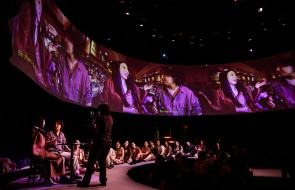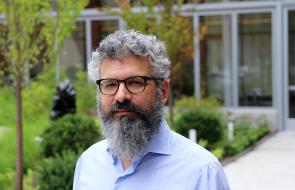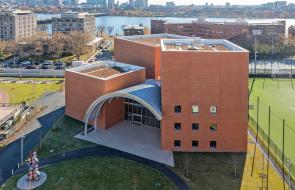El Mundo, Friday, July 14, 2017
UVE
Music / Dance
CONCIERTO L'AUDITORI
THE FANTASTIC SYMPHONY OF DAVID BOWIE
Evan Ziporyn conducts the OBC in a program of orchestral versions of music by the English musician
By Javier Blánquez, Barcelona
There may be some for whom the concepts of 'Bowie' and 'symphonic' don’t go together, some who think it is like mixing water and oil, or trying to put two magnets together at their positive poles, which therefore repel. But David Bowie's music, especially in its most artsy stages, has always been an easy pairing (marriage) with non-rock textures especially electronic, and orchestral. It has always sounded genuine in that respect.
Philip Glass, in fact, has two symphonies - the first from 1992 and the fourth from 1996 - inspired by two Bowie albums: Low and Heroes. So prior to the experience scheduled yesterday at the Auditori - the European premiere of the orchestration of the bicolor chameleon's latest album, Blackstar, written by Evan Ziporyn - Bowie had already been symphonic. But last night another color was added to his music, a rich and adventurous density that easily and unforced, connected high culture with popular culture, very much like the English composer Mark-Anthony Turnage. It was probably one of the best box offices in the Auditori all season.
What's more, it was like a program of the Proms, the classic cycle of classical music that takes place every summer in London, where there are performances ranging from popular works, to adaptations of pop music and even dance music, to the colossal format of the Symphony orchestra, and where musicians dress informally.
Last night, that is, there were blue lights projected on the walls and almost total darkness on the stage; the director of the show, Ziporyn, seemed to want to hop on the podium and appeared in a sort of fitted trench coat, as if chic men's fashion would go better with a baton than a watch or shoes, and the main cellist, Maya Beiser, appeared sheathed in leather, with platform shoes that are often seen in Gothic circles, but not in auditoriums. Relaxed aesthetics for music that, in practice, proved to be dense and vibrant, for an audience that may not frequent concert halls, but which may be encouraged after proving that such an experience does not bite.
Before beginning to play his orchestration of Blackstar Concerto, immediately after starting the program with Antonin Charvat's version of Space Oddity - in which a delicate cloak of strings underlined the immortal melody and added weightlessness to the harmony – Ziporyn explained that he decided to adapt Bowie's last testament to the dimensions of a large orchestra because his death was so sudden that, like so many people, he felt hopelessly orphaned. "I wanted Bowie's music to be with us a bit longer," he said, and his work has merit: the orchestration is rich and precise - with electric piano, tubular bells, sax, and a larger percussion section than usual, that attacks broken and irregular rhythms while entangled in harmonic tautness- Blackstar, turned over to the orchestra, is surprisingly atonal.
In fact, this orchestration of Blackstar has the form of a cello concerto, as the instrument simulates Bowie's voice, low and elusive, and Maya Beiser played its part with inventiveness - using delay effects, or hitting the box as a cajon (percussion) - with amplification; in the absence of virtuosic demands, she won the applause of the public for her imposing stage presence, especially commanding the two encores at the end: a Pink Floyd version of Wish you Were Here (so I wish Bowie could have heard this homage) and a fun adaptation of Let's dance. There was no dance, but nobody could hide all the happy faces.




